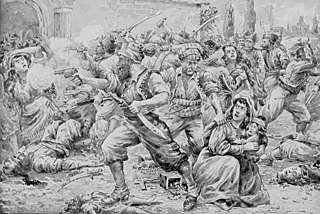Baydarlı may refer to the following places:
- Baydarlı, Azerbaijan, a village in Qakh District, Azerbaijan
- Baydarlı, Turkey, a town in Tokat Province, Turkey
Baydarlı may refer to the following places:

Azerbaijani or Azeri, also referred to as Azeri Turkic or Azeri Turkish, is a Turkic language from the Oghuz sub-branch spoken primarily by the Azerbaijani people, who live mainly in the Republic of Azerbaijan where the North Azerbaijani variety is spoken, and in the Azerbaijan region of Iran, where the South Azerbaijani variety is spoken. Although there is a very high degree of mutual intelligibility between both forms of Azerbaijani, there are significant differences in phonology, lexicon, morphology, syntax, and sources of loanwords.
Oghuz or Oğuz may refer to:
Aras may refer to:
Agri may refer to:

An ashik or ashugh is traditionally a singer-poet and bard who accompanies his song—be it a dastan or a shorter original composition—with a long-necked lute in Turkic and non-Turkic cultures of South Caucasus. In Azerbaijan, the modern ashik is a professional musician who usually serves an apprenticeship, masters playing the bağlama, and builds up a varied but individual repertoire of Turkic folk songs.

Anti-Armenian sentiment, also known as anti-Armenianism and Armenophobia, is a diverse spectrum of negative feelings, dislikes, fears, aversion, racism, derision and/or prejudice towards Armenians, Armenia, and Armenian culture.

Relations have always been strong between Azerbaijan and Turkey, the only two predominantly Turkic countries located west of the Caspian Sea. Former Azerbaijani president Heydar Aliyev often described the two as being "one nation, two states."
Kamran is a Persian male given name meaning 'prosperous, fortunate'. The name is commonly used in Iran and Azerbaijan, in addition to Tajikistan, Afghanistan, Uzbekistan, and Pakistan. Variants include Kâmran, Kamron, and Kamuran.
Sari Gelin or Sari Aghjik is the name for a number of folk songs popular among the people of Iran, the southern Caucasus and in eastern Anatolia in present-day Turkey. All versions of the song use the same melody and are written in the Bayati makam or mode, but are sung with different lyrics. The consensus about its country of origin is contested.
Kara Dag or Qara Dag is Turkic for "Black Mountain". It may be written as one word (Karadag), a hyphenated word (Kara-dag), or as two words. Any of these spellings may refer to:

The Baku–Tbilisi–Kars (BTK), or Baku–Tbilisi–Akhalkalaki–Kars railway (BTAK), is a railway connecting Azerbaijan, Georgia and Turkey, which became operational on 30 October 2017 following several years of delays. The project was originally due to be completed by 2010, but was delayed to 2013, 2015, 2016, and, following a fifth trilateral meeting in February 2016, foreign ministers of the three countries announced that the railway would finally be completed in 2017.
Bayat may refer to:
Baydarlı is a village and municipality in the Qakh Rayon of Azerbaijan. It has a population of 368.
Aysel is a feminine Turkish given name popular in Turkey and Azerbaijan. In Turkish, "Aysel" means "bright moon".

Mevlüt Çavuşoğlu is a Turkish diplomat and politician who is currently a member of the Grand National Assembly. He also served as the Minister of Foreign Affairs of Turkey from August 2014 to August 2015, and again from 24 November 2015 to 6 June 2023.
Akdere, also spelled Ağdərə or Agdara or Agdere, is a Turkic place name and may refer to:

Sinan Oğan is a Turkish politician who won a seat in the Turkish parliament in 2011 with the far-right Nationalist Movement Party (MHP). He was the presidential candidate of ATA Alliance for the 2023 Turkish presidential election, which resulted in a second round. He finished in third place, therefore he was described as a potential kingmaker. He proceeded to support the People's Alliance candidate Recep Tayyip Erdoğan, who was subsequently elected president in the second round of the election.
Fazil may refer to:
İbrahimoğlu or Ibrahimoghlu is a Turkish and Azerbaijani surname. Its literal meaning of "descendant of Ibrahim" is similar to that of the Bosnian surname Ibrahimović and the Albanian family name Brahimaj and it strongly indicates Muslim religious affiliation of its bearer. People with the name include:

The Second Nagorno-Karabakh War was an armed conflict in 2020 that took place in the disputed region of Nagorno-Karabakh and the surrounding territories. It was a major escalation of an unresolved conflict over the region, involving Azerbaijan, Armenia and the self-declared Armenian breakaway state of Artsakh. The war lasted for 44 days and resulted in Azerbaijani victory, with the defeat igniting anti-government protests in Armenia. Post-war skirmishes continued in the region, including substantial clashes in 2022.